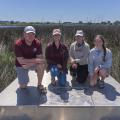Environment
Mississippi’s diverse outdoor environment has something for everyone. Whether you love walking the coastal beaches, love to explore our state and national parks, or live for the abundant recreational hunting and fishing opportunities, Mississippi is an exciting place to explore nature.
Mississippi’s natural resources are vast, but not unlimited. Growing pressures from urban development, invasive species, and natural disasters demand scientific solutions and dedicated effort from everyone. The MSU Extension Service offers trustworthy, science-based information on a variety of topics, from managing wild hogs to making wise decisions about the family forest.
Publications
News
When you think about the holidays, all the food, gifts, holiday décor, and gatherings with friends and family likely come to mind. What you may not think about is how much garbage we create during this season. Check out these tips that can help you recycle this holiday season.
Coastal development compounded with the impacts of climate change are making natural resource managers struggle with restoring and managing coastal uplands due to the heavy front-end investment an
Success Stories
Mississippi State University and partners have been awarded a grant of nearly $6.6 million from the National Fish and Wildlife Federation for shoreline restoration work on the Gulf Coast.
Crosby Arboretum is a living memorial to L. O. Crosby, a philanthropist, forester, and civic leader who loved nature. In the early 1980s, his family turned his former strawberry farm into a place that could instill a love of nature in others.
The Application Guide was created by a writing team of Extension and engagement professionals across the country, and Dr. Renee Collini was the lead author.






